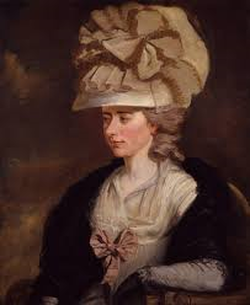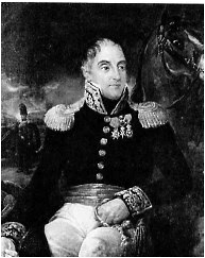

A version of this post appeared in the Burmey Letter, Vol. 21, No. 1, a publication of The Burney Society, Spring 2015
Burney wrote: “…upon reflection, I will write no account of these great events, which have been detailed so many hundred times, and so many hundred ways, as I have nothing new to offer upon them; I will simply write the narrative of my own history at that awful period.”
With this modest declaration, Frances Burney, Madame D’Arblay, describes her famous account of Brussels during time leading up to, during, and after the Battle of Waterloo in 1815. In vivid terms, she chronicles the tension and anxiety felt by the helpless people waiting for their fate to be decided.
General Alexandre d’Arblay (1748-1818), Burney’s beloved husband, even at the age of 66, served King Louis XVIII in his personal Guard. The d’Arblays occupied a residence in Paris, and had an active life there. But when Napoleon escaped from Elba in March 1815 and headed for Paris, assembling a powerful army as he came, Louis fled. He had been restored to the throne for just over a year and now abandoned Paris and crossed Belgian border to the relative safety of the United Netherlands. d’Arblay had to accompany the King, but he insisted his wife should accompany their friend the Princess d’Heinin into Belgium as well, not a simple task it turned out
Many British families lived in Brussels at the time, having taken advantage of the Peace of 1814 to enjoy a stay on the continent, which they had been unable to visit during the Napoleonic Wars. Like most of the world, they were shocked when Napoleon Bonaparte suddenly returned to France; Paris was about 160 miles from Brussels.
Once she reached Brussels, Madame d’Arblay found many friends among the French evacuees and the ex-pat English as well. When her husband was able to join her for several weeks, she was blissful. They even got to travel a bit and sightsee at the Palace of Lachen:
“…my dearest friend (the General, her husband) indulged in one morning's recreation, which proved as agreeable as anything at such a period could be to a mind oppressed like mine. He determined that we should visit the Palais de Lachen, which had been the dwelling assigned as the palace for the Empress Josephine by Bonaparte at the time of his divorce. My dearest husband drove me in his cabriolet, and the three gentlemen whom he invited to be of the party accompanied us on horseback. The drive, the day, the road, the views, our new horses-all were delightful, and procured me a short relaxation from the foresight of evil.
“The Palace of Lachen was at this moment wholly uninhabited, and shown to us by some common servant. It is situated in a delicious park d'Anglaise, and with a taste, a polish, and an elegance that clears it from the charge of frippery or gaudiness, though its ornaments and embellishments are all of the liveliest gaiety. There is in some of the apartments some Gobelin tapestry, of which there are here and there parts and details so exquisitely worked that I could have ‘hung over them enamoured.’"
While together, the couple also had the opportunity of attending a concert at which they observed the Duke of Wellington, Commander of the Allied Armies.
“Our last entertainment here was a concert in the public and fine room appropriated for music or dancing. The celebrated Madame Catalani had a benefit, at which the Queen of the Netherlands was present, not, however, in state, though not incognita; and the king of warriors, Marshal Lord Wellington, surrounded by his staff and all the officers and first persons here, whether Belgians, Prussians, Hanoverians, or English. I looked at Lord Wellington watchfully, and was charmed with every turn of his countenance, with his noble and singular physiognomy and his eagle eye. He was gay even to sportiveness all the evening, conversing with the officers around him. He never was seated, not even a moment, though I saw seats vacated to offer to him frequently. He seemed enthusiastically charmed with Catalani, ardently applauding whatsoever she sung, except the "Rule Britannia”; and there, with sagacious reserve, he listened in utter Silence. Who ordered it I know not, but he felt it was injudicious in every country but our own to give out a chorus of ‘Rule, Britannia! Britannia, rule the waves!’
“And when an encore began to be vociferated from his officers, he instantly crushed it by a commanding air of disapprobation, and thus offered me an opportunity of seeing how magnificently he could quit his convivial familiarity for imperious dominion when occasion might call for the transformation.”
The d’Arblay’s idyll ended when the General was sent off to Luxembourg to recruit soldiers for the royal cause. Frances was left alone to worry and share the concerns of her friends, some bordering on hysteria, as tension steadily increased in the next few weeks. Everyone knew the battle was approaching.
“May 13, 1815. My best friend left me to begin his campaign; left me, by melancholy chance, upon his birthday (67th). I could not that day see a human being -- I could but consecrate it to thoughts of him who had just quitted me yet who from me never was, never can be, mentally absent , and to our poor Alexander (their son), thus inevitably, yet severely cast upon himself.”
For the month following his departure, she visited with friends, strolled in the park, attended church, and observed everything with her keen eye for detail. She also spent many hours alone, writing and worrying about her son, not doing as well at Cambridge as his parents expected, and particularly about her husband.
One of Burney’s most fascinating observations was her view of the Belgian people, for the most part stoic and phlegmatic. As she observed, they had been traded back and forth between warring factions for centuries, spending most of the last decade as part of Napoleon’s Empire. How indeed could they get excited about another change in status? They seemed placidly to accept their fate, to Frances’s incredulity and sometimes consternation. But even in the midst of the unconcerned populace, tensions rose as the streets were crowded with military vehicles horses and soldiers everywhere.
She had a near-encounter with the notorious Lady Caroline Lamb*, whose affair with Byron had shocked London. Burney writes, “…I just missed meeting the famous Lady Caroline Lamb … whom I saw crossing the Place Royale,… dressed, Or rather not dressed, so as to excite universal attention, and authorise every boldness of staring, from the general to the lowest soldier, among the military groups then constantly parading the Place, -- for she had one shoulder, half her back, and all her throat and neck, displayed as if at the call of some statuary for modelling a heathen goddess. A slight scarf hung over the other shoulder, and the rest of the attire was of accordant lightness. As her ladyship had not then written, and was not, therefore, considered as one apart, from being known as an eccentric authoress, this conduct and demeanour excited something beyond surprise, and in an English lady provoked censure, if not derision, upon the whole English nation.”
Aside from amusement at Burney’s disapproval of the attire, it is interesting to speculate about whether she thought of herself as an “eccentric author” and thus “beyond surprise.”
This was a time of considerable unease for her. “During this melancholy period when leisure, till now a delight, became a burthen to me, I could not call my faculties into any species of intellectual service; all was sunk, was annihilated in the overpowering predominance of anxiety for the coming event…”
TO BE CONTINUED...

 RSS Feed
RSS Feed